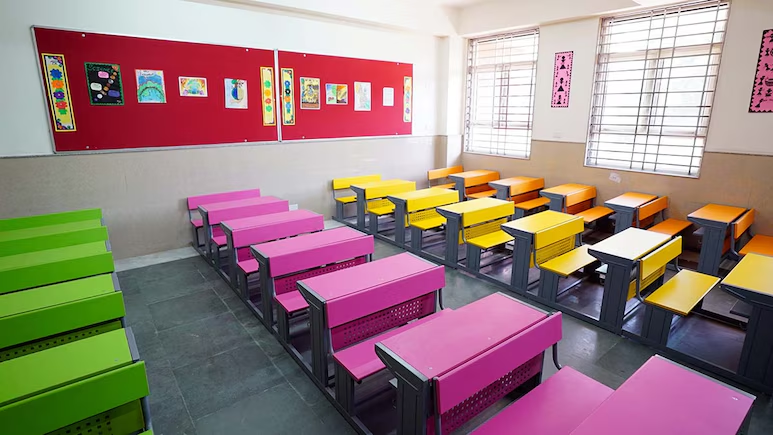
While the year 2020 saw disruptions in the academic session due to the ongoing COVID-19 pandemic, this year will also be remembered for the major developments at the educational front. Apart from the new National Education Policy (NEP) 2020, the Union Government has made several reforms in the education sector this year including the move to merge UGC and AICTE and establishment of National Medical Commission.
With the year coming to an end, let us look at the major policy changes made in the education front in 2020.
National Education Policy
The new National Education Policy 2020 that was approved by the Union Government on July 29, 2020, intends to make substantial reforms in the school and higher education system. The new National Education Policy 2020 (NEP 2020) has replaced the National Policy on Education of 1986. It was last modified in 1992.
The new National Education Policy 2020 proposes a restructuring of higher education into three categories of institutions that conduct research, teach and are degree-granting colleges. NEP 2020 phases out the system of affiliated colleges and seeks to turn institutions that specialise in specific domains into multidisciplinary ones.
School Education In NEP 2020
The NEP 2020 seeks to universalise Early Childhood Care and Education (ECCE) for children aged between three and six years by 2030 and also achieve 100 per cent gross enrolment ratio (GER) in school education over the same period. Apart from the focus on ECCE, NEP 2020 also emphasises on measuring learning outcomes and assessments.
The new NEP 2020 proposes to test the students of Class 3, Class 5, Class 8, Class 10 and Class 12 on the basis of their cognitive skills. Under the new national education policy, the board exam patterns will be changed, and report cards will be more detailed. In addition a new standard-setting body, PARAKH, has been proposed to guide testing.
To unburden students of Class 1 to Class 10, the Education Ministry has also introduced a policy on school bags in line with NEP 2020. As per the school bag policy, the weight of the school bags of Classes 1 to 10 students should not be more than 10 per cent of their body weight.
Higher Education In NEP 2020
NEP 2020 has introduced a new option for the undergraduate degree students to exit the course and enter within a stipulated period. With the introduction of this new exit-option, students can take a break from the undergraduate programme and come back again within a specified period without losing the credits earned during the previous session.
Stress On Regional Languages
NEP 2020 stresses on the use and learning of regional or local languages. The local or regional language, as per the provisions of the new National Education Policy 2020, will be the medium of instruction in all schools up to Class 5. However, the new NEP 2020 also says "no language will be imposed on any student" in any state.
Higher Education Commission of India
The setting up of the Higher Education Commission of India (HECI) as a ‘single overarching umbrella body for the entire higher education' in line with NEP 2020 has been proposed. HECI seeks to replace the University Grants Commission (UGC), All India Council for Technical Education (AICTE), and the National Assessment and Accreditation Council (NAAC).
However, the professional councils including Indian Council for Agricultural Research (ICAR), Veterinary Council of India (VCI), National Council for Teacher Education (NCTE), Council of Architecture (CoA), National Council for Vocational Education and Training (NCVET) will act as Professional Standard-Setting Bodies (PSSBs).
UGC's Online Degree Programmes
The University Grants Commission (UGC), in a recent reform has finalised its online and distance learning regulations to provide easier access to students. The decision to relax regulations for launching online programmes was announced in the Union Budget 2020. Institutions, under the Integrated Online and Distance Learning Regulations, with a NAAC grade of 3.26 and above and feature in the top 100 in NIRF's university rankings will not require any separate permission to launch online degree courses.
National Medical Commission (NMC)
The National Medical Commission (NMC) has replaced the Medical Council of India (MCI) from September 25, 2020. The new National Medical Commission has been constituted for the development and regulation of all aspects of medical education and profession. Four autonomous boards under the new NMC Act -- the Under-Graduate Medical Education Board (UGMEB), Post-Graduate Medical Education Board (PGMEB), Medical Assessment and Rating Board and the Ethics and Medical Registration Board -- have also been constituted as part of the new commission.
Engineering Courses In Mother Tongue
From 2021 onward, students pursuing Engineering degrees will also have the option to study the technical course in their mother tongue. A few Indian Institutes of Technology (IITs) and National Institutes of Technology (NITs) have already been shortlisted to impart engineering degrees in their mother tongue. A task-force in this regard has also been established by the Ministry of Education on imparting technical education in the mother tongue.
In the recently released JEE Main 2021 notification, the National Testing Agency has also provided the students with the option of selecting their choice of a prefered language. The JEE Main 2021 question papers will be made available in 13 languages. While JEE Main 2021 question paper will be in Hindi, English and Urdu across the nation, other regional language papers including in Assamese, Bengali, Gujarati, Kannada, Marathi, Malayalam, Odia, Punjabi, Tamil and Telugu will be held in the respective states.
